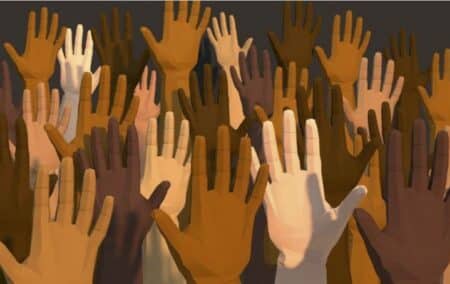I got a call last week from a public relations practitioner who confessed that she was surprised that ‘you even answered your phone’.
I wondered why. ‘Because of the anger you have caused,’ she said, ‘… with that billboard saying “racism is not a problem”.’
Well, of course, that isn’t what the billboard says – a very different point is made by the actual wording, ‘racism is not the problem’ – and, anyway, it goes without saying that bunkering down under our desks in fearful anticipation of criticism is not the kind of option you can expect to find in the IRR handbook on how to win friends and influence people.
I had barely drawn the caller’s attention to the actual wording when she demanded to know: ‘So, are you going to take it down?’
‘Absolutely not,’ I replied. ‘We have no intention of ignoring the plight of the black majority.’
And how ironic, you realise, that turning a blind eye to this plight is about the most acceptable thing you can do in South Africa today.
I sensed that, inwardly at least, the caller was willing to concede that the significance of a backward and narrow-minded fringe who cling to racist ideas is scant to the point of being ignorable compared to the real difficulties millions of South Africans contend with day in, day out. After all, these are difficulties that are every day reflected in the media, on the streets, in the workplace, in classrooms, in school and university data, income tables, vulnerability to crime and abuse, and quality-of-life scores.
Yet the most piercing insight to emerge from the misguided rumpus over the billboard is that honestly examining the reasons for the chronic conditions of today – pitiful growth born of reckless policies, deficient schooling, rising joblessness, gathering insecurity and the mounting despair at corruption and state malfunction – may carry the intolerable risk of having to abandon the spent explanatory power of racial oppression. It is as if that is impermissible, since it is the only thing that now stands in the way of facing the unpalatable truth of post-1994 South Africa’s compounding failures in addressing the great costs of our history.
More than a lapse of observation
In this sense, the misreading of ‘the’ as ‘a’ in the following selection of tweets is conceivably more than a betrayal of the authors’ lapse of observation.
Observing from a distance, Justice Malala wrote last week of his exasperation at the absence of any sense of outrage among South Africans at the shabby contempt with which the ANC regards them.
Contrasting UK health secretary Matt Hancock’s prompt resignation (for being found to have breached Covid regulations by canoodling with an aide) with the anything-goes conventions that apply to official improbity in South Africa, Malala noted: ‘Around the same time that Hancock was resigning, the presidency announced that Deputy President David Mabuza had requested a few days’ leave to visit Russia “for a scheduled medical consultation”.’
He went on: ‘That, dear reader, is the deputy president of a country where NGO Gift of the Givers had to drill boreholes at Rahima Moosa and Helen Joseph hospitals in June because those facilities had no water. He is going to Russia for medical treatment while his own people have to get treated in hospitals without water. Where is our outrage?’
‘Should have resigned’
On embattled health minister Zweli Mkhize, he wrote: ‘Sadly, the ANC’s supporters fail to act even when the evidence against an individual is overwhelming.’ Mkhize, he said, ‘should not be on “special leave”. He should have resigned or been recalled already.’
But, no. Returning to Mabuza’s Russian junket, Malala concluded: ‘He will come back and continue with his life. Hospitals in SA will remain the broken entities that they are. It won’t affect him at all. Impunity is the name of the game in SA politics.’
To see these events as isolated aberrations, the mistakes or misjudgements of flawed individuals rather than as the emblems they actually are of the real state of the nation, is equivalent to misplacing ‘a’ for ‘the’ in the IRR’s billboard.
And the unmistakable consequence is a willingness to contemplate the South African condition with callous unconcern.
Inconveniently for our critics, it is IRR data – perhaps more than any other – that reveals the scale of what self-described ‘progressives’ are so content to turn a blind eye to.
A choice example from last week is the reported statement of Nelson Mandela University political lecturer Ongama Mtimka. ‘In South Africa,’ he said, ‘the foundations of political-economical life are 350 years of colonialism and apartheid. So, you cannot – in a country with that much history and with proven legacies of apartheid that still remain with us – minimise the pain in the manner the billboard was doing.’
Let that sink in
It’s when you let that sink in that you realise how profoundly indifferent the pampered intelligentsia has become not only to the real problems that millions face every day of their lives, but also to what is probably the largest and the most serious-minded body of thinking and constructive policy research that is aimed at solving them.
This is the challenge represented by that billboard on the M1 South in Jo’burg, and which – impermissibly for some, it seems – is rendered unignorable by the critical distinction between ‘a’ and ‘the’ in the five-word phrase emblazoned on it.
If you like what you have just read, support the Daily Friend

